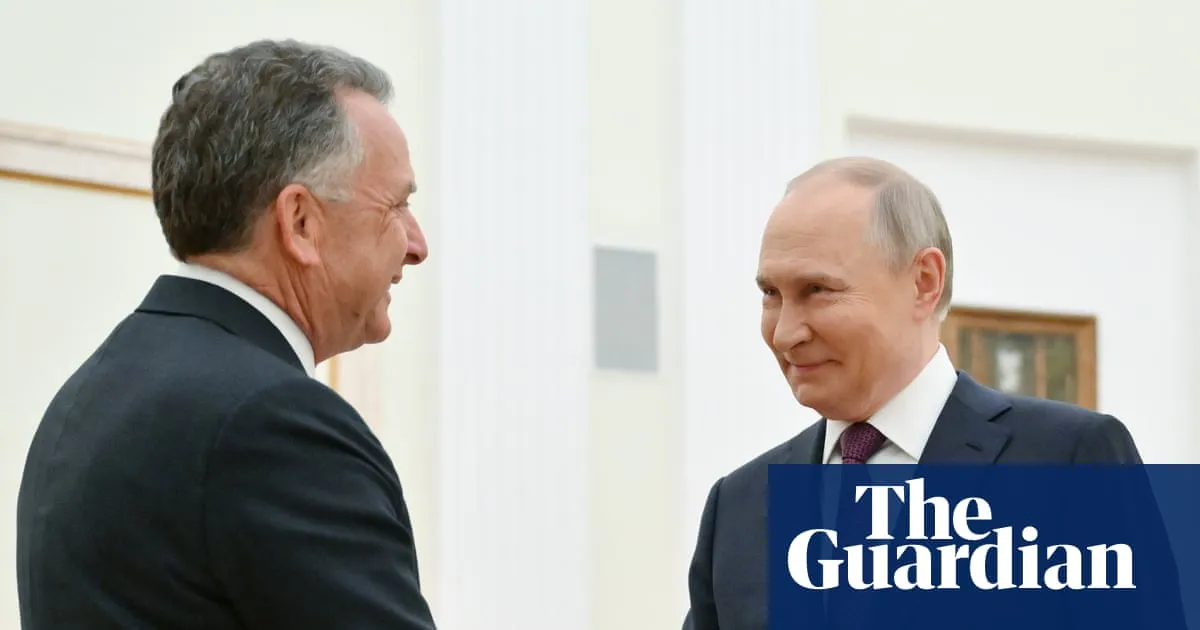
Former President Donald Trump has recently stated that his strategy to conclude the ongoing war in Ukraine has been “fine-tuned.” He announced the appointment of envoy Steve Witkoff to meet with Russian President Vladimir Putin, alongside Army Secretary Dan Driscoll, who will engage with Ukrainian officials. Despite the White House's optimism surrounding these diplomatic efforts, there appears to be minimal progress on critical sticking points.
Trump indicated that his son-in-law, Jared Kushner, may also participate in the Witkoff-Putin meeting. “Steve Witkoff is going over maybe with Jared. I’m not sure about Jared going, but he’s involved in the process, smart guy, and they’re going to be meeting with President Putin, I believe next week in Moscow,” Trump shared with journalists aboard Air Force One. This potential collaboration aims to bolster the negotiations aimed at achieving peace in Ukraine.
In a notable shift from his earlier position, Trump has backed away from a self-imposed Thursday deadline for Ukraine to agree on a US-backed peace plan. He commented, “The deadline for me is when it’s over.” Trump downplayed the portion of his plan that suggests Ukraine would need to cede territory to Russia, indicating that Russian forces are already likely to secure the land they desire. “The way it’s going, if you look, it’s just moving in one direction,” he remarked, suggesting that the territory in question may soon fall under Russian control.
Trump has expressed interest in meeting both Putin and Ukrainian President Volodymyr Zelenskyy, but only after significant progress has been made in negotiations. He shared this hope on his Truth Social platform, stating, “I look forward to hopefully meeting with President Zelenskyy and President Putin soon, but ONLY when the deal to end this War is FINAL or, in its final stages.” His comments come in light of ongoing negotiations involving US, Russian, and Ukrainian officials in Abu Dhabi.
Witkoff has been instrumental in advising a senior Kremlin official on how to best present a peace deal to Trump. A recorded conversation with Yuri Ushakov, a top foreign policy aide to Putin, revealed that Witkoff suggested framing discussions in a more optimistic manner. This recording sheds light on Witkoff's negotiating strategies and highlights the development of a controversial 28-point peace proposal.
Meanwhile, the conflict continues to escalate, with Russian forces launching a mass drone attack on the southeastern Ukrainian city of Zaporizhzhia. This attack occurred late on Tuesday, resulting in 12 injuries and significant damage to buildings and vehicles, according to regional governor Ivan Fedorov. The assault destroyed shops and damaged multiple apartment blocks, highlighting the ongoing humanitarian crisis.
In a related incident, NATO jets were deployed to monitor two Russian drones that entered Romanian airspace. German Typhoon and Romanian fighter jets were mobilized to track these uncrewed aircraft. The first drone returned to Ukraine, while the second was later found downed in Puieşti, approximately 70 miles from Ukraine. Officials revealed that German pilots were prepared to engage the second drone, which ultimately crashed, likely due to fuel depletion.
Following a meeting of leaders from Britain, France, and Germany, support for Trump's efforts to conclude the war in Ukraine was reaffirmed. The leaders, including Keir Starmer, Emmanuel Macron, and Friedrich Merz, emphasized that any resolution must involve Ukraine and adhere to the principle that borders should not be altered by force. This sentiment underscores the ongoing commitment to maintaining stability and peace in Europe and beyond.
In a recent decree, Russian authorities outlined a strategy aimed at consolidating the Russian language and identity in territories of Ukraine that have been integrated since Russia's 2022 invasion. This document, titled “Strategy of Russia’s national policy in the period to 2036,” aims for 95% of the population in these areas to identify as Russian by 2036.
In France, authorities have arrested three individuals on suspicion of espionage for Russia and promoting its war propaganda. Among those detained is a 40-year-old Russian man, captured on surveillance footage engaging in pro-Russian activities near the Arc de Triomphe in Paris. This arrest forms part of a larger investigation into a French-Russian association.
Additionally, South African police are probing allegations that a daughter of former President Jacob Zuma deceived men into fighting for Russia in Ukraine. Reports indicate that Duduzile Zuma-Sambudla allegedly misled individuals into believing they were traveling to Russia for legitimate paramilitary training. This troubling development highlights the complexities of recruitment and the international ramifications of the ongoing conflict.